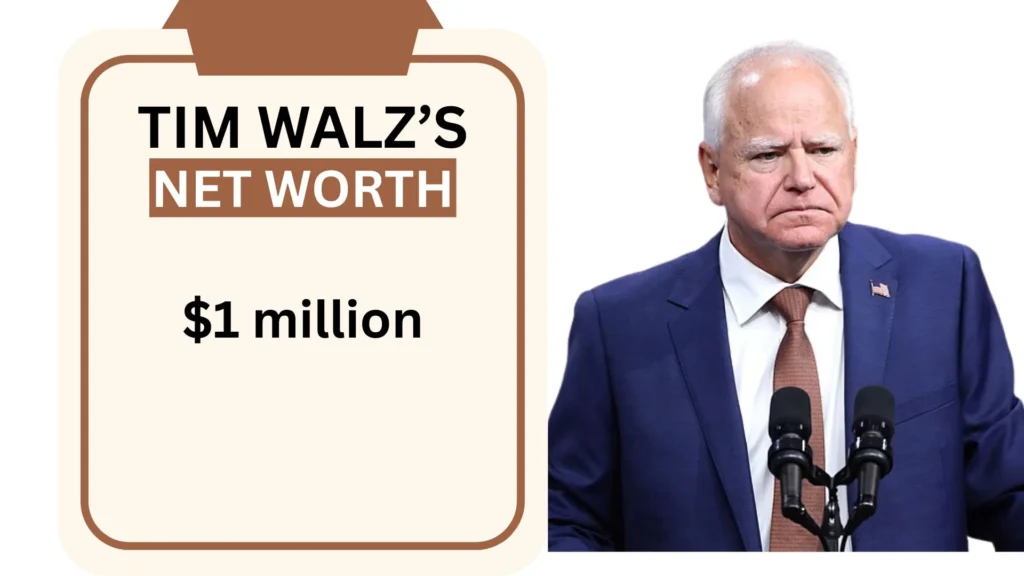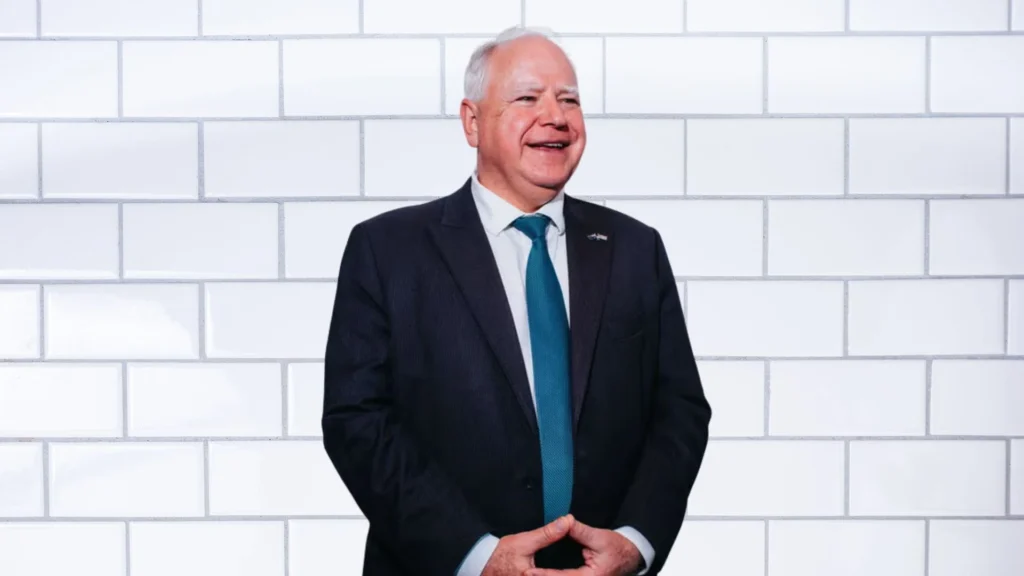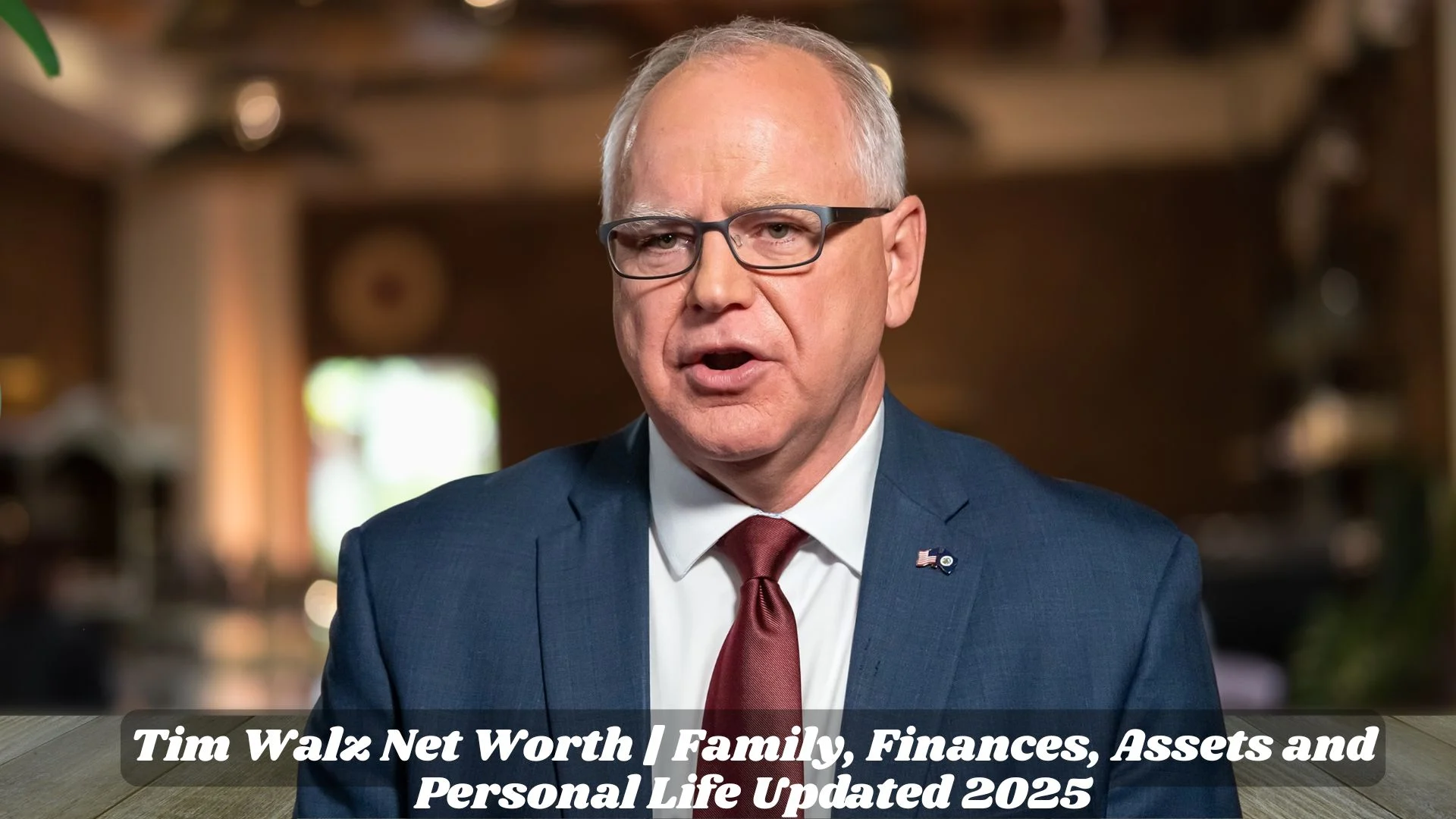Tim Walz’s net worth is estimated to be under $1 million.
Tim Walz’s wife, Gwen Walz, is a supportive partner and former special education teacher. She often stays out of the political spotlight but is known for her advocacy on education and family issues.
Gwen and Tim have been married for over 25 years, and she frequently appears alongside him at public events. The couple’s strong family values play a key role in Walz’s political messaging.
Tim Walz’s son, Gus, gained national attention during the 2024 Democratic National Convention for his emotional reaction during his father’s speech.
Gus has been diagnosed with non-verbal learning disorder (NVLD), ADHD, and anxiety, which his parents have described openly. The family emphasizes his strengths and resilience, highlighting how he inspires them daily.
Gus is now a high school student in St. Paul.
Tim Walz’s daughter, Hope, is a young adult pursuing a career as a social worker and ski instructor. She graduated from Montana State University and is known to be close to her family.
Hope has supported her father’s political campaigns while maintaining a relatively private life. Her grounded nature complements the family’s public image.
Tim Walz’s children—Gus and Hope—are both adults who embody the Walz family’s commitment to openness and support. Despite their different paths, they share a close bond with their parents and occasionally appear in public with them.
Their stories have humanized Walz’s political persona and deepened public interest in his family background. The Walz children play a key role in his personal life and public narrative.
Tim Walz’s brother is a Republican who has publicly stated he is “100% opposed to all his ideology.” The siblings reportedly have not spoken in several years, reflecting their stark political differences.
Jeff Walz’s statements surfaced during the 2024 campaign, drawing media attention to the personal divide. Despite this, Tim Walz focuses on his political goals rather than family conflicts.
Tim Walz’s family is often described as close-knit and grounded. He frequently credits his wife and children for their unwavering support throughout his political career.
The family’s values emphasize education, resilience, and community service. Public appearances often highlight the Walz family’s warmth and unity, distinguishing them from typical political families.
Tim Walz’s and JD Vance’s personal finances couldn’t be more different, with Walz living a modest lifestyle with limited wealth, while JD Vance, a venture capitalist and author, possesses a much higher net worth and financial assets.
This contrast highlights differing backgrounds and financial strategies between the two political figures.
Their personal finances have become a talking point during the 2024 vice-presidential race, symbolizing broader political and economic divides.
Tim Walz’s name misspelled as Tom on some Palm Beach County overseas ballots
In September 2024, Palm Beach County officials discovered that 257 emailed ballots sent to overseas and military voters mistakenly listed “Tom Walz” instead of “Tim Walz”—the Democratic vice-presidential nominee and Minnesota governor.
The county corrected the error within 18 hours, notified affected voters, and reissued the ballots. Election supervisors confirmed the typo would not affect vote counts.
Ann Coulter deletes post mocking Tim Walz’s son after onslaught of criticism

In August 2024, conservative commentator Ann Coulter posted a now-deleted comment on X (formerly Twitter), calling attention to Walz’s 17-year-old son, Gus, during the DNC speech.
She wrote, “Talk about weird…” alongside a photo of Gus crying. The post sparked backlash after it emerged that Gus has non-verbal learning disorder, ADHD, and anxiety—a diagnosis Tim and Gwen Walz described as his “secret power.”
Coulter removed the post amid criticism and made no direct apology.
Tim Walz’s sharp Trump–Musk remark
At a campaign event in October 2024, Walz took aim at Elon Musk for backing Donald Trump, calling him “Trump’s running mate” and even referring to him as a “dipsh*t.”
He criticized Musk for contributing to Trump-aligned PACs and for political influence via giveaways.
Tim Walz’s ‘white guy tacos’ quip gets MAGA all hot and bothered
In an August 2024 conversation with Kamala Harris, Walz joked he prefers “white guy tacos”—defined as ground beef and cheese with no seasoning.
The light-hearted remark ignited a conservative backlash, labeled “racist and disgusting” by some, with MAGA personalities accusing him of hypocrisy since he had once shared a spiced taco casserole recipe.
What is wrong with Tim Walz’s son

Walz’s son, Gus, has received a diagnosis including non-verbal learning disorder (NVLD), ADHD, and anxiety, as confirmed by his parents in interviews and People magazine.
NVLD is a condition marked by strengths in verbal skills but struggles with nonverbal learning—such as interpreting social cues, spatial tasks, and motor coordination.
Despite these challenges, Gus is described as “brilliant, hyper‑aware of details,” and showcases his emotions openly—his proud moment at the DNC touched many.
🧑🤝🧑 Tim Walz’s brother is ‘100% opposed to all his ideology’

Tim’s older brother, Jeff Walz, a Florida-based Republican, publicly disavowed his brother’s politics in August 2024.
On Facebook, he wrote he is “100% opposed to all his ideology” and revealed they hadn’t spoken since 2016.
Jeff later told NewsNation his post was meant only for family and friends, expressing regret for the public attention. He emphasized he didn’t intend to sway voters.
💰 Tim Walz’s finances

- Salary & Wealth: As governor of Minnesota, Walz earns approximately $127,629 annually, which he refused to increase in 2023.
- Net worth: He is among the least wealthy major-party national candidates, with an estimated net worth under $1 million. His wealth mainly comprises state/federal pensions, modest life insurance, and college savings—not stocks or real estate.
- Financial moves: In 2023, he withdrew $135,000 from retirement savings to help pay for his daughter’s college tuition.
👧👦 Tim Walz’s kids

Walz and his wife Gwen are parents to two adult children:
- Hope Walz (born 2001): A social worker and ski instructor, she graduated from Montana State University and was present with the family at the 2024 DNC.
- Gus Walz (born 2006): Now 18, Gus is a high school student in St. Paul. He gained national attention during his father’s DNC speech and openly expressed his emotions and pride in his dad.
🏐 Chicago coach quits after disparaging remarks on radio show about Tim Walz’s son
In August 2024, Amy Jacobson, the head volleyball coach at Amundsen High School in Chicago, resigned following remarks she made during a radio show that mocked Gus Walz’s emotional reaction at the DNC.
Her comments sparked backlash, and she stepped down soon after.
❓ Does Tim Walz’s son have autism?
There is no credible evidence or official confirmation that Gus Walz is autistic.
His family publicly stated that doctors diagnosed him with a non-verbal learning disorder (NVLD), along with ADHD and an anxiety disorder—but notably not autism.
A Pressed‑For‑Detail Net Worth Estimate
Tim Walz’s federal financial disclosures from 2019 estimate his net worth between $117,000 and $330,000, with most assets tied up in pensions and annuities.
While this range may seem imprecise to some, this variability is actually a strength—it demonstrates transparent reporting within legal limits, reflecting his middle‑class roots and avoidance of hidden wealth.
Instead of opaque holdings, Walz’s finances are open and accountable.
Pension‑Heavy Portfolio as Strength

Beyond the headline figure, Walz’s financial foundation rests on diverse public‑service pensions—from 24 years in the National Guard, 12 years in Congress, and years as a teacher.
While detractors may label this as “not liquid,” it actually embodies the essence of a career public servant, and adds significant underlying value—analysts estimate combined pensions worth $800,000 or more .
Turning that weakness into a strength, these pensions show stability, not speculation.
No Stocks, No Real Estate—Intentional Simplicity
Walz’s portfolios include no stocks, bonds, or private investments, and he sold his home in 2019—choosing rentals or the governor’s mansion.
Critics may argue this demonstrates a lack of wealth-building strategy. However, the strength lies in his simplicity and avoidance of conflicts of interest.
In an era when politicians often have tangled financial webs, Walz’s transparent, easy-to-audit finances send a powerful message of ethics and integrity.
Salary Choices Reflect Discipline
Serving as Minnesota governor, Walz earns $127,629 annually—a figure he could have increased but declined in 2023.
If elected vice president, he’d earn $235,100/year, but—and this speaks to his character—he turned down a state-level raise.
What some may view as “weakness” (declining income) is really a commitment to public service over personal gain, showing alignment with everyday Americans’ values.
Modest Income, Vibrant Middle‑Class Life
Walz and his wife reported a combined $299,000 total income in 2023, including pensions, gubernatorial salary, and Gwen’s compensation.
They don’t live a flashy lifestyle—they sold their house and raised their family without investing in real estate.
Rather than facing criticism for “lack of wealth,” they show that many working families can relate to their modest profile, proving that meaningful public service doesn’t require being a multimillionaire.
Transparency in Reporting as Political Advantage
No hidden investments, no shell companies—Walz’s financial disclosures are simple and verifiable.
One could criticize this as a “thin” portfolio, but it’s a strategic asset: voters, ethics watchdogs, and media can easily evaluate his finances, reducing suspicion and building trust.
In today’s political landscape, clean books are a competitive edge.
Comparison With Other Politicians | A Genuine Alternative
When compared to figures like JD Vance (net worth in the multi‑millions), Walz appears modest. This contrast is a strength.
He doesn’t represent elite wealth; he represents middle‑class America.
His financial profile underscores his authenticity as a candidate who genuinely shares the experiences of many Americans—working, saving, raising a family.
Conclusion
Tim Walz’s net worth may seem “weak” in traditional terms—limited in liquid assets, modest in scale, and lacking star investments.
Yet these very traits are his financial strengths: they reflect transparency, public service, simplicity, and relatability. In a world where financial opacity often breeds distrust, Walz’s fiscal profile offers voters clarity, credibility, and an alternative to multimillionaire politicians.
His pensions ensure long-term security without compromising ethical integrity, and his choice to live modestly reinforces his connection to the middle class.
Ultimately, Walz’s net worth is not a liability—it’s a statement about who he is and who he represents.

Dulcie Mae is a passionate storyteller, known for her ability to weave deep emotions into captivating narratives. With a unique voice that resonates with readers around the world, she explores themes of love, loss, and personal growth through her writing.
She is the acclaimed author of “Whispers Between the Pages”, a heartfelt novel about rediscovering oneself after heartbreak, and “Beneath the Lavender Sky”, a poetic journey through healing and hope. Her latest release, “The Silence of Wildflowers”, has touched the hearts of many with its lyrical prose and unforgettable characters.




